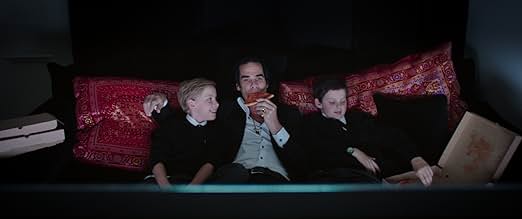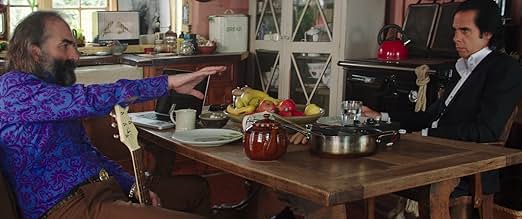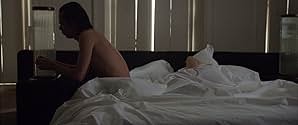Writer and musician Nick Cave marks his 20,000th day on the planet Earth.Writer and musician Nick Cave marks his 20,000th day on the planet Earth.Writer and musician Nick Cave marks his 20,000th day on the planet Earth.
- Nominated for 1 BAFTA Award
- 8 wins & 18 nominations total
Susie Bick
- Susie Cave
- (as Susie Cave)
- Directors
- Writers
- All cast & crew
- Production, box office & more at IMDbPro
Storyline
Did you know
- Crazy creditsThe credits are shown over a twilight scene of Brighton, shot from the sea.
- ConnectionsFeatures The Passion of Joan of Arc (1928)
- SoundtracksCan't Get You Out of My Head
Written by Cathy Dennis and Rob Davis (as Robert Davis)
Performed by Kylie Minogue
Published by EMI Music Publishing Ltd and Universal/MCA Music Ltd
Licensed courtesy of Parlophone Records Ltd
Featured review
"Who knows their own story? Certainly, it makes no sense when we live in the midst of it. It's all just clamour and confusion. It only becomes a story when we tell it and retell it. Our small precious recollections that we speak again and again to ourselves or to others. First creating the narrative of our lives and then keeping the story from dissolving into darkness."
Occupying a gray zone between documentary and autobiographical fiction film '20,000 Days on Earth' opens with a counter that, you guessed it, starts at zero and rapidly counts up to 20,000 in a mere 1 1/2 minutes all the while on a couple of screens we see Nick Cave in various stages of his life as well as TV footage that corresponds with the number of days (e.g. a boy smoking pot around day 5,000) or people that apparently were of significance to him around that particular time (so in the early days we for example see Johnny Cash, Elvis and of course Barbara Eden). It's a loud and chaotic montage that simultaneously serves as the opening credits. The first scene stands in stark contrast to it, through the storm of the past we have arrived in the present day. We see an alarm clock without a seconds hand giving the impression of time virtually standing still. Nick Cave lies in bed staring at his clock before it starts to ring to officially herald the start of day 20,000.
The film that follows feels thorough, self-contained and complete.
Thorough because it keeps returning to the same memories. First Nick Cave has a session with his psychoanalyst which feels as much like an interview with a journalist as it does like a couch session, for there is no couch but the "interviewer" asks more psychoanalyst type of questions that very often go back to Cave's childhood days. Questions like: "What's your earliest memory of a female body?" or "What's your earliest memory of your father?", each question being answered with a story. Later Cave exchanges memories about the Nina Simone concert that he earlier talked about to his psychiatrist with a colleague who was at the concert as well which of course transforms the same story, it becomes fuller, the atmosphere surrounding it changes, etc. Or at another point Nick Cave goes to the Nick Cave archive because of course when you are somebody like Nick Cave you don't keep your old junk in boxes, you get other people to do that for you...anyway. Objects from the stories he told his psycho-guy pop up again or rather he asks for them, like the copy of "Lo-li-ta" from which his father read to him one day and that made little Nick see a side of his father that he hadn't known before. Or a picture of Susie, who became his wife, which leads into a dazzling multimedia collage of sight, sound and spoken word about Nick Cave's erotic fantasies that climaxes where all good erotic fantasies climax, with Jackie Kennedy at JFK's funeral. Songs come back also, he writes a song, practices a song, records a song, records a background track with a children's choir, and finally performs it in the Sydney Opera House in front of a big audience.
Self-contained it feels because there is a clear core theme which always is a challenge in an (auto)biographical film, because how can a human life be summed up to one idea? Here that idea is that Nick Cave basically lives as a vessel for his memories, to acquire them, to put them into a narrative in order not to forget them, and to use them to create songs. His greatest fear, he says, is losing his memory. "...in some way that's really what the process of songwriting is for me. It's the retelling of these stories and the mythologizing of these stories." The people in those stories become mere figures, figures that he, as he puts it, cannibalizes for his creations.
Unsurprisingly, Cave in the film comes across as self-absorbed and to call the product navel-gazing I think would be a pretty fair assessment. For the sake of context it bears reminding that this film doesn't show much of Nick Cave the private person and instead is much more about Nick Cave the musician and the public person. No doubt his profession is what enables and I think at least to an extent also excuses his constant self-examination, after all he made a successful career out of it.
And finally, complete it feels because the ending, a live-performance of a song we have seen and heard played several times throughout, is aided by footage of old live performances from the band history that often show him making the same movements on stage, reminding not only of the start of the film, but also that this performance that currently is the unfathomable now, will soon become a part of this man's memory turned life narrative. Put on film it shows one version of the event as it happened, something that will help Nick Cave keep the story from dissolving into darkness. But it also doesn't need a Nick Cave anymore to write a song about it, as a film it already is a mythologized narrative and it exists independent of any self-absorbed musicians that may happen to be the subject of '20,000 Days on Earth'.
Occupying a gray zone between documentary and autobiographical fiction film '20,000 Days on Earth' opens with a counter that, you guessed it, starts at zero and rapidly counts up to 20,000 in a mere 1 1/2 minutes all the while on a couple of screens we see Nick Cave in various stages of his life as well as TV footage that corresponds with the number of days (e.g. a boy smoking pot around day 5,000) or people that apparently were of significance to him around that particular time (so in the early days we for example see Johnny Cash, Elvis and of course Barbara Eden). It's a loud and chaotic montage that simultaneously serves as the opening credits. The first scene stands in stark contrast to it, through the storm of the past we have arrived in the present day. We see an alarm clock without a seconds hand giving the impression of time virtually standing still. Nick Cave lies in bed staring at his clock before it starts to ring to officially herald the start of day 20,000.
The film that follows feels thorough, self-contained and complete.
Thorough because it keeps returning to the same memories. First Nick Cave has a session with his psychoanalyst which feels as much like an interview with a journalist as it does like a couch session, for there is no couch but the "interviewer" asks more psychoanalyst type of questions that very often go back to Cave's childhood days. Questions like: "What's your earliest memory of a female body?" or "What's your earliest memory of your father?", each question being answered with a story. Later Cave exchanges memories about the Nina Simone concert that he earlier talked about to his psychiatrist with a colleague who was at the concert as well which of course transforms the same story, it becomes fuller, the atmosphere surrounding it changes, etc. Or at another point Nick Cave goes to the Nick Cave archive because of course when you are somebody like Nick Cave you don't keep your old junk in boxes, you get other people to do that for you...anyway. Objects from the stories he told his psycho-guy pop up again or rather he asks for them, like the copy of "Lo-li-ta" from which his father read to him one day and that made little Nick see a side of his father that he hadn't known before. Or a picture of Susie, who became his wife, which leads into a dazzling multimedia collage of sight, sound and spoken word about Nick Cave's erotic fantasies that climaxes where all good erotic fantasies climax, with Jackie Kennedy at JFK's funeral. Songs come back also, he writes a song, practices a song, records a song, records a background track with a children's choir, and finally performs it in the Sydney Opera House in front of a big audience.
Self-contained it feels because there is a clear core theme which always is a challenge in an (auto)biographical film, because how can a human life be summed up to one idea? Here that idea is that Nick Cave basically lives as a vessel for his memories, to acquire them, to put them into a narrative in order not to forget them, and to use them to create songs. His greatest fear, he says, is losing his memory. "...in some way that's really what the process of songwriting is for me. It's the retelling of these stories and the mythologizing of these stories." The people in those stories become mere figures, figures that he, as he puts it, cannibalizes for his creations.
Unsurprisingly, Cave in the film comes across as self-absorbed and to call the product navel-gazing I think would be a pretty fair assessment. For the sake of context it bears reminding that this film doesn't show much of Nick Cave the private person and instead is much more about Nick Cave the musician and the public person. No doubt his profession is what enables and I think at least to an extent also excuses his constant self-examination, after all he made a successful career out of it.
And finally, complete it feels because the ending, a live-performance of a song we have seen and heard played several times throughout, is aided by footage of old live performances from the band history that often show him making the same movements on stage, reminding not only of the start of the film, but also that this performance that currently is the unfathomable now, will soon become a part of this man's memory turned life narrative. Put on film it shows one version of the event as it happened, something that will help Nick Cave keep the story from dissolving into darkness. But it also doesn't need a Nick Cave anymore to write a song about it, as a film it already is a mythologized narrative and it exists independent of any self-absorbed musicians that may happen to be the subject of '20,000 Days on Earth'.
- Perception_de_Ambiguity
- Jul 20, 2015
- Permalink
- How long is 20,000 Days on Earth?Powered by Alexa
Details
- Release date
- Country of origin
- Official sites
- Language
- Also known as
- Dünyada 20,000 Gün
- Filming locations
- Production companies
- See more company credits at IMDbPro
Box office
- Gross US & Canada
- $279,558
- Opening weekend US & Canada
- $27,879
- Sep 21, 2014
- Gross worldwide
- $2,105,558
- Runtime1 hour 37 minutes
- Color
- Sound mix
- Aspect ratio
- 2.35 : 1
Contribute to this page
Suggest an edit or add missing content





























